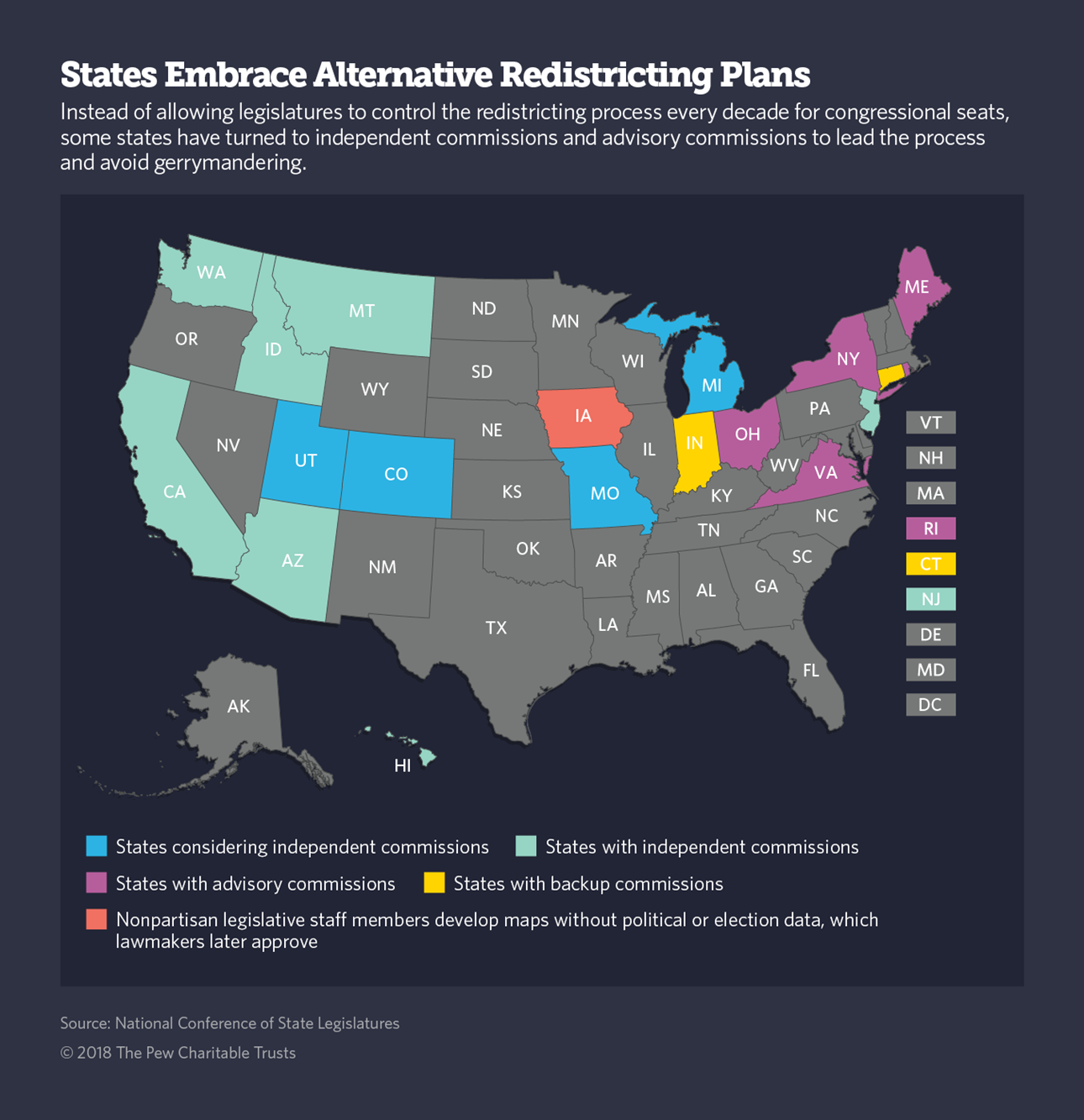Connecting state and local government leaders
In November, voters in Colorado, Michigan, Missouri and Utah will decide whether independent commissioners instead of state lawmakers should draw draw congressional and state legislative maps.
This article was originally published by Stateline, an initiative of The Pew Charitable Trusts, and was written by Matt Vasilogambros.
Discouraged by seemingly endless court battles, gerrymandering opponents in some states are shifting their strategy two years before the 2020 census sparks another round of redistricting for legislative seats.
Voters in Colorado, Michigan, Missouri and Utah will decide in November whether to have independent commissioners, rather than state lawmakers, draw congressional maps and the lines for state legislative seats. Except for Colorado, where lawmakers added the ballot measure, activists got these initiatives on the ballot by gathering signatures. And earlier this year, Ohio voters overwhelmingly approved a measure that requires bipartisan support for new lines, though the power to draw them returns to the majority party if several redistricting attempts fail. The new system goes into effect in 2021.
Activists in several other states, including Arkansas, Oklahoma and Virginia, where a federal court recently determined that the Legislature unconstitutionally packed African-Americans into districts to restrict their political clout, are hoping to get their own initiatives onto the ballot.

Brian Cannon, executive director of One Virginia 2021, is working with supportive lawmakers to get the measure introduced this January, which would begin the process of putting it on the November 2020 ballot. The measure has bipartisan support, including from former Republican gubernatorial candidate Ken Cuccinelli and former Democratic House Minority Leader Ward Armstrong.
“This isn’t a partisan thing,” Cannon said. “No one runs to keep gerrymandering.”
But there are still state leaders who remain skeptical, including Republican Del. Buddy Fowler, who last year said, “I don’t think it is wise to hand over constitutional obligations and duties of elected people to unelected people.”
And in other states, such as Republican-dominated Texas, state lawmakers are determined to maintain their district-drawing power. In June, the U.S. Supreme Court rejected a challenge to the state’s new congressional maps, ruling that Texas lawmakers did not intentionally discriminate against Latino and black voters in drawing them.
After the Supreme Court ruling, Republican Texas Attorney General Ken Paxton praised the decision, saying it “protects the right of Texans to draw their own legislative districts.”
Republican Project
In the runup to the 2010 census, the Republican State Leadership Committee made a national effort to gain control of state legislatures with the hope of seizing redistricting power. The “Redistricting Majority Project” was a staggering success: Republicans now control 31 state legislatures. And with the help of computer algorithms, they have redrawn congressional and legislative maps to give their party enormous advantages. Even in some purple states, where the number of registered Republicans and Democrats is nearly equal, Republicans dominate the state’s congressional delegation because of gerrymandered districts.
According to the Brennan Center for Justice at New York University School of Law, “Democrats would need to win by a nearly unprecedented margin in 2018 to gain control of the House of Representatives” because of the way maps are designed. The center highlighted the maps in Michigan, North Carolina and Pennsylvania, saying they “consistently have the most extreme measures of bias.”
Despite the many legal challenges to these maps, the U.S. Supreme Court has never struck down a state’s congressional map because of partisan gerrymandering, though it has rejected maps because they harmed racial minorities.
This year, the Supreme Court considered legal challenges to the Maryland and Wisconsin congressional maps, which opponents said were unfairly drawn to benefit the parties in charge—Democrats in Maryland and Republicans in Wisconsin.
But the high court declined to rule on whether the maps were unconstitutional. Regarding Maryland, it said in an unsigned opinion that it could not issue a ruling until there was a trial. And Chief Justice John Roberts said the plaintiffs in the Wisconsin case had not shown they were hurt by the Legislature’s actions.
In North Carolina, Republicans currently hold 10 of the state’s 13 House seats, even though there are more registered Democrats than Republicans. When state lawmakers approved new maps in 2016, North Carolina state Rep. David Lewis, the Republican in charge of drawing the state’s congressional maps, said it was legal to “draw the map to give a partisan advantage” to Republicans.
But last month, a panel of three federal judges declared North Carolina’s congressional district map unconstitutional. A week later, the panel decided the map should be used for the midterm election in November, because there was “insufficient time” to draw new lines.
Allison Riggs, the attorney who led the challenge against North Carolina’s map, is busy preparing for the state’s likely appeal to the Supreme Court next term. Riggs fears that gerrymandering efforts will get even more sophisticated with the development of new data and mapping techniques, and believes that voters and activists should push for new systems, such as independent commissions.
“I’m seeing voters getting frustrated at the process,” said Riggs, the senior voting rights attorney for the Southern Coalition for Social Justice, a North Carolina-based nonprofit legal advocacy group. “But until voters translate that frustration to oust people, I don’t have a lot of hope that good sense will kick in and politicians will be responsive.”
Compact and Competitive
Voting experts largely agree that independent commissions are the fairest way to draw district lines. Maps drawn by such panels are more compact, more competitive and respect local boundaries more than maps drawn by state legislators, said Michael Crespin, a professor of political science at the University of Oklahoma.
Crespin coauthored a 2017 study in the Journal of Politics that found independent commissions may “do a better job of preserving the population cores.” But, he said, politicians aren’t rushing to adopt independent commissions and give up redistricting power.
“Politicians always have an incentive to draw districts that work for them, and they’re always going to be pushing the limits,” Crespin said. “That’s politics. Whatever the rules are, you’re going to stretch them to your advantage.”
This year, legislators in 18 states considered more than 60 bills to change the redistricting process. Many of the measures aimed to create independent commissions to draw and approve congressional districts, like the panels in Arizona, California, Hawaii, Idaho, Montana, New Jersey and Washington.
Each state’s commission has its own redistricting standards and members are selected differently. In California, for example, government auditors select commissioners from a large applicant pool. But in Washington, legislative leaders can choose registered voters to serve on the bipartisan commission.
In Iowa, nonpartisan legislative staff members develop maps without political or election data, which lawmakers later approve.
In five other states—Maine, New York, Ohio, Rhode Island and Virginia—advisory committees can assist the legislature in drawing district lines. And if lawmakers cannot agree on new congressional maps in Connecticut and Indiana, backup commissions create the new maps.
In Colorado, voters in November will consider two proposed constitutional amendments, each creating an independent commission for legislative redistricting and congressional redistricting. Each commission would have a dozen members, four Democrats, four Republicans and four independents. Unaffiliated voters are now the largest voting bloc in the state at 38 percent.
The proposed amendments enjoy rare bipartisan support in Colorado, including from the Republican Senate president and the Democratic House speaker. Not a single member of the General Assembly voted against bringing the measures to the ballot.
“Both sides played the game the way the game was set up,” said Curtis Hubbard, a spokesman for Fair Maps Colorado. “That’s why we’re trying to eliminate the gamesmanship.”
Fifty-five percent of voters will have to vote in favor of the amendments to add them to the constitution. Educating voters on this complicated issue remains a challenge, Hubbard said.
Karin Mac Donald also faced that problem in California, where voters in 2008 passed a proposition that handed redistricting duties to an independent commission comprised of 14 voters—five Democrats, five Republicans and four independents.
Mac Donald, the director of the state’s redistricting database housed at the University of California at Berkeley, was a consultant for the state auditor during the last round of redistricting. Californians, she said, were concerned that unelected people were going to determine political fortunes.
“Right now, it’s the devil you know,” Mac Donald said. “Maybe they think it’s not that bad. And people who aren’t getting good representation are already marginalized anyway. You have to mobilize people who feel they’re not part of the system right now, and that’s pretty hard.”

NEXT STORY: California’s Record on Climate Change Is a Stark Rebuttal to Trump



